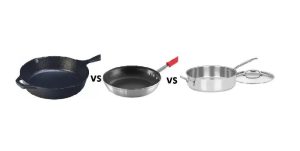Grapeseed Oil for Seasoning Cast Iron Skillets! Is It Safe?
This article may contain affiliate links, which means if you make a purchase following our links won’t cost you extra, but we may earn a commission.
Grapeseed oil is a top choice for seasoning cast iron skillets. Its high smoke point and neutral flavor make it ideal for this purpose.
Seasoning a cast iron skillet with grapeseed oil enhances its non-stick properties and protects it from rust. Cast iron cookware, including pans and grills, benefits immensely from this oil.
Grapeseed oil is safe for seasoning and cooking, ensuring that your skillet remains in prime condition for years. Its grill-grade quality ensures that it can withstand high temperatures without breaking down, making it a preferred choice for many chefs and home cooks.
One of the main concerns with seasoning cast iron is the temperature at which the oil should be applied. Grapeseed oil’s high smoke point means it can endure the heat required to effectively season the skillet. This ensures a smooth, even layer that enhances the skillet’s performance.
So, if you’re pondering whether grapeseed oil is good for seasoning cast iron, the answer is a resounding yes. Its properties not only maintain the skillet’s integrity but also elevate the cooking experience by providing a consistent and reliable surface.
Grapeseed Oil Benefits for Cast Iron Seasoning
Grapeseed oil stands out as a top choice for seasoning cast iron cookware. Its unique properties make it a favorite among chefs and home cooks alike. The oil is known for its high smoke point, which means it can withstand high temperatures without breaking down.
This is crucial for seasoning cast iron, as the process requires the oil to be heated to a point where it polymerizes and forms a protective layer on the cookware. Beyond its high smoke point, grapeseed oil has a neutral flavor.
This ensures that the taste of your food remains unaltered, allowing the natural flavors of your ingredients to shine through.
Seasoning with grapeseed oil also offers enhanced non-stick properties, ensuring that your food slides off the pan with ease.
Recommended Oil: La Tourangelle, Expeller-Pressed Grapeseed Oil

How to Use Grapeseed Oil on Cast Iron Skillets
Grapeseed oil, with its high smoke point and neutral flavor, is an excellent choice for seasoning cast iron skillets. Seasoning with this oil not only protects the skillet from rust but also enhances its non-stick properties. Here’s how to use grapeseed oil for seasoning your cast iron skillet:
Step 1: Clean the Skillet
Before seasoning, ensure the skillet is clean. Wash it with warm water and a soft brush. Avoid using soap as it can strip away any existing seasoning. Dry the skillet thoroughly, ensuring no moisture remains, as this can lead to rust.
Step 2: Preheat the Oven
Heat your oven to 400°F to 500°F. This temperature range is ideal for seasoning with grapeseed oil, allowing the oil to polymerize effectively.
Step 3: Apply the Grapeseed Oil
Pour a small amount of grapeseed oil onto a cloth or paper towel. Rub the oil all over the skillet, ensuring a thin, even layer covers both the interior and exterior. Remove any excess oil to prevent it from pooling during the seasoning process.
Step 4: Place the Skillet in the Oven
Position the skillet upside down in the preheated oven. This ensures any excess oil drips away, leaving a smooth, even layer. Allow the skillet to bake for an hour.
Step 5: Cool and Store
After an hour, turn off the oven and let the skillet cool inside. Once cooled, the skillet will have a shiny, non-stick surface. Store it in a dry place, ready for your next cooking adventure.
Step 6: Regular Maintenance
To maintain the seasoned surface, cook with the skillet regularly. After each use, clean it with warm water and a soft brush. If the skillet starts to lose its non-stick properties or shows signs of rust, simply repeat the seasoning process.

Cast Iron Seasoning Grapeseed Oil Temperature
Achieving the perfect seasoning on your cast iron requires attention to temperature. Grapeseed oil, with its high smoke point, is ideal for this task.
It’s essential to heat the oil to a temperature where it can polymerize and create a protective layer on the skillet. Typically, heating the skillet with grapeseed oil from around 400°F to 500°F is recommended.
This temperature range ensures that the oil forms a solid, non-stick layer on the skillet, enhancing its performance and longevity.
Grapeseed Oil Smoke Point and Its Relevance to Cast Iron Seasoning
The smoke point of an oil is the temperature at which it begins to produce smoke and break down. Grapeseed oil boasts a high smoke point, making it particularly suitable for seasoning cast iron.
This high threshold ensures that the oil remains stable during the seasoning process, allowing it to form a durable, protective layer on the skillet.
This layer not only prevents rust but also provides a natural non-stick surface, enhancing the skillet’s overall performance.
Grapeseed Oil vs. Flaxseed Oil for Cast Iron Seasoning
The debate between grapeseed oil and flaxseed oil for seasoning cast iron is ongoing. Both oils have their merits. Grapeseed oil, with its high smoke point and neutral flavor, is excellent for those who frequently cook at high temperatures.
On the other hand, flaxseed oil, rich in omega-3 fatty acids, can provide a slightly harder and more durable seasoning layer. Yet, it has a lower smoke point and can sometimes impart a distinct taste to food.
In terms of ease of application and consistent results, many prefer grapeseed oil for its reliability and performance.
Tips for Maintaining Grapeseed Oil Seasoned Cast Iron Skillets
Maintaining a cast iron skillet seasoned with grapeseed oil is straightforward. Regularly cooking with the skillet helps reinforce the seasoning. After each use, clean the skillet with warm water and a soft brush.
Avoid using soap as it can strip away the protective layer. Dry the skillet thoroughly to prevent rust. Periodically, you might find the need to re-season the skillet.
Simply apply a thin layer of grapeseed oil and heat it in the oven to reinforce the protective layer. With proper care, your grapeseed oil-seasoned skillet will serve you for years to come.
FAQs
Why Choose Grapeseed Oil for Seasoning?
Grapeseed oil has gained popularity for seasoning cast iron skillets due to its high smoke point and neutral flavor. This ensures the skillet gets a protective layer without any added taste, enhancing the non-stick properties of the skillet.
Is Grapeseed Oil Better Than Other Oils for Seasoning?
While many oils can be used for seasoning, grapeseed oil stands out because of its high smoke point. This means it can withstand the high temperatures required for seasoning without breaking down, making it a reliable choice.
How Often Should I Re-season with Grapeseed Oil?
It’s advisable to re-season your skillet whenever it starts to lose its non-stick properties or shows signs of wear. Regular cooking with the skillet can also help maintain the seasoning.
Can Grapeseed Oil Prevent Rust on My Skillet?
Yes, seasoning with grapeseed oil forms a protective layer on the skillet, preventing moisture from coming into contact with the iron and thus preventing rust.
Does Grapeseed Oil Alter the Taste of Food?
No, grapeseed oil has a neutral flavor, ensuring that the taste of your food remains unaltered.
Is Grapeseed Oil Expensive to Use for Seasoning?
While grapeseed oil might be slightly pricier than some other oils, its effectiveness and the small amount needed for seasoning make it a cost-effective choice in the long run.
Are There Any Side Effects to Using Grapeseed Oil on Skillets?
No, grapeseed oil is safe for seasoning and cooking. It doesn’t produce harmful fumes or residues, ensuring your food remains safe to consume.
Conclusion
Based on the numerous benefits and effectiveness of grapeseed oil for seasoning cast iron skillets, it’s evident that this oil is a top choice for both professional chefs and home cooks. Its high smoke point, neutral flavor, and ability to provide a durable non-stick surface make it a valuable asset in any kitchen. For those seeking to maintain the quality and longevity of their cast iron cookware, grapeseed oil proves to be an excellent choice.





